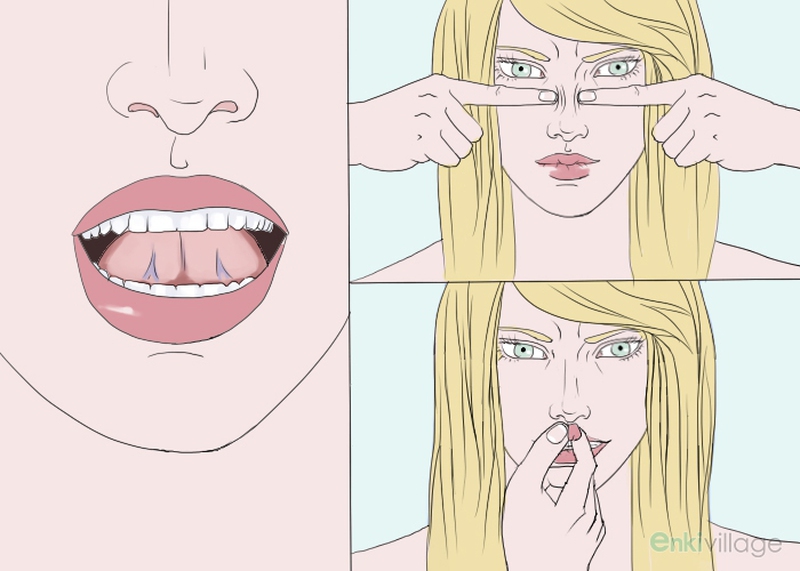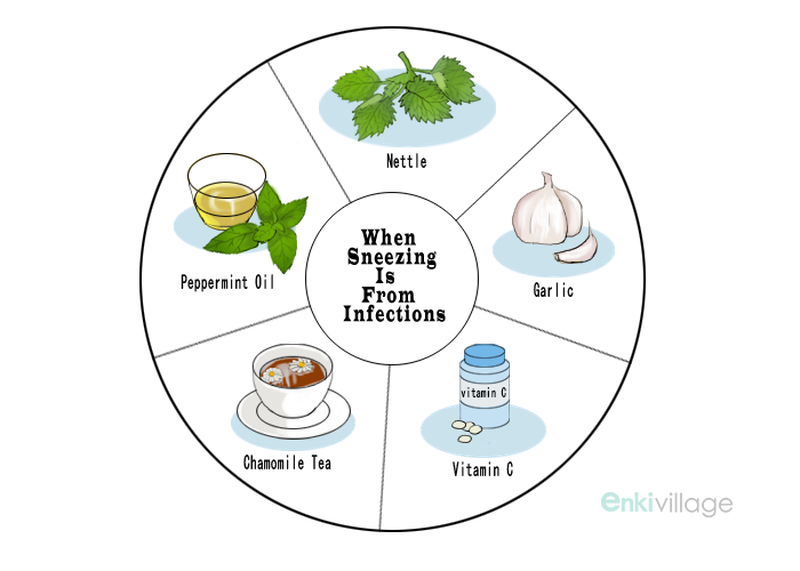Although sneezing is annoying, it is a way that the body naturally protects itself by expelling irritants and allergens. Some of the most common reasons someone sneezes are pollen, wood dust, mold, smoke, animal dander, allergies, and other irritants. Sneezing may also be influenced by certain drugs, food allergies, strong smells, rainwater, or changes in temperature and/or humidity. Luckily, you won’t have to look hard to learn how to stop sneezing as there are many home remedies for this ailment.
How to Stop Sneezing
Precaution
Before getting into too much detail about home remedies for sneezing, it is important to realize that you should never hold a sneeze in. If you choose to hold your sneeze back via clenching, you may damage your eyes, ear drums, or blood vessels. Instead, try one of these tips for how to stop sneezing and if they don’t work, just let the sneeze out.
Pinch The Upper Lip
Take your forefinger and thumb and use them to pinch on your upper lip. Do this lightly and at the same time, press the lip upwards in the direction of your nostrils. To get the motion right, have your thumb heading in the direction of one nostril with the forefinger going towards the other, which will bunch your upper lip a small amount.
Use The Tongue
For this method of how to stop sneezing, move your tongue so it is pressing directly behind the two front teeth on the top of your mouth. This should put your tongue right where the alveolar ridge or gum palate meets the roof of the mouth. Do your best to press as hard as you can and the tickling sensation should dissipate in a short amount of time.
Pinch Underneath The Nose
Hold your hand underneath your eyes horizontally and then take the side of the forefinger and press it into your nose’s cartilage. Be sure to place it directly underneath the bone that makes up the bridge of the nose. Pinching in this location will pinch a nerve that is responsible for triggering sneezes.
Tickle The Roof Of The Mouth
This home remedy for how to stop sneezing involves taking the tip of the tongue and flexing it. Then try to touch this part of the tongue to the roof of the mouth anytime you feel a sneeze is on its way. This may take up to five to ten seconds, but your sneeze should disappear.
When Sneezing Is From Infections
Take Advantage of Nettle
There are two options for this home remedy for sneezing. You can either find nettle supplements at your local health food store or make yourself some nettle tea to enjoy. In either case, the nettle will relieve the congestion as well as any nose itchiness you are feeling due to the imminent sneeze.
Peppermint Oil
Peppermint oil has antibacterial properties that can help counter sneezing from a stuffy nose. Simply boil water, adding in five drops peppermint oil. Breathe in steam rising from the pot with boiling water, being sure to cover your head using a towel to keep the steam concentrated. This steam will clear the nasal passages when inhaled. If your sneezing is from a cold or nasal irritation, swap out the peppermint oil for eucalyptus oil.
Chamomile Tea
This is commonly considered a top method of how to stop sneezing from allergies and its antihistamine properties may give you instant relief. Take a cup of water that is boiling and add in a teaspoon dried chamomile flowers. Let the tea keep boiling a few minutes and add honey for flavor. Have this tea twice each day to reduce sneezing. You can also try nettle or Echniacea tea.
Garlic
Garlic does wonders at fighting upper respiratory infections because it has natural antiviral and antibiotic properties. You can either use it externally or internally for relief from sneezing due to the common cold. Try making a paste by crushing four or five garlic cloves. Inhale the fragrance of this paste as doing so will clear your nasal passages, letting you breathe easier and reducing sneezing. You can also eat more garlic by adding it to meals.
Vitamin C
Vitamin C helps reduce histamine production in your body, which in turn controls sneezing. This means that if you have the common cold, try to get vitamin C from orange juice or lemonade. Bioflavonoid also works like vitamin C as it has antioxidant properties that control the production of histamine, reducing sneezing. You can get bioflavonoid naturally through your diet, like broccoli and citrus fruit.
When Sneezing Is From Allergies
In some cases, sneezing will be because of foreign substances in the environment. If this is the case, try to stay in contact with your doctor and know what items you are allergic to. Try to minimize the effects of your allergies by keeping windows and doors shut.
Ask your doctor about taking antihistamines for your sneezing. These should help you stop sneezing and also eliminate other allergy symptoms, including itchy eyes, runny nose, and coughing. Although some, such as Benadryl, will probably make you drowsy, there are other options, including Claritin, that have fewer side effects.



View All Comments /Add Comment